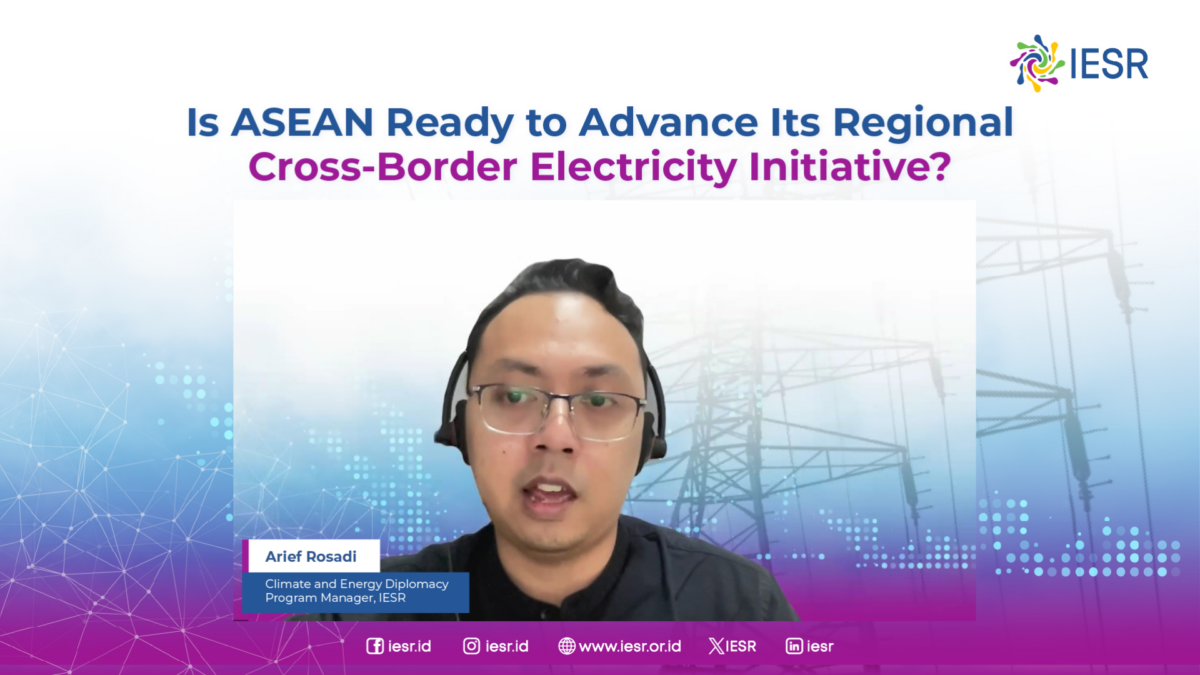Jakarta, April 16, 2025 – Energy security that supports emissions reduction must become a primary focus in developing cross-border electricity connectivity projects across the ASEAN region through the ASEAN Power Grid (APG). Highlighting Malaysia’s leadership as ASEAN Chair this year and its commitment to finalize the updated APG Memorandum of Understanding (MoU), the Institute for Essential Services Reform (IESR) sees APG as a strategic opportunity to drive cross-border electricity supply from renewable energy sources.
During a webinar titled “Is ASEAN Ready to Advance Its Regional Cross-Border Electricity Initiative?” organized by IESR, Arief Rosadi, Climate and Energy Diplomacy Program Manager at IESR, emphasized that the climate crisis presents a serious threat to economic growth and development in the region. He stated that ASEAN could potentially lose up to 37 percent of its GDP due to the impacts of climate change.
Arief noted that as the region’s economy continues to grow, energy consumption is also projected to increase significantly. According to the 8th ASEAN Energy Outlook, ASEAN’s total final energy consumption is projected to reach 1,107.9 million tons of oil equivalent (Mtoe) by 2050, a 2.6-fold increase from 2022 levels.
“Optimizing the ASEAN Power Grid (APG) by prioritizing electricity from renewable sources is a solution to meet growing energy demand across countries in the region, while also avoiding carbon lock-in due to continued reliance on fossil fuels such as coal. This step can contribute to climate change mitigation efforts and reduce the risk of economic losses,” Arief explained.
Echoing Arief’s statement, Nadhilah Shani, Manager of Power Generation and Interconnection (PIN) at the ASEAN Centre for Energy (ACE), emphasized that regulatory alignment and strong political commitment through a renewed MoU are crucial for advancing cross-border electricity trade.
“Increasing renewable-based cross-border electricity trade through APG is necessary to maximize the use of the region’s clean energy potential. To achieve this, we need to overcome infrastructure and market mechanism barriers, including harmonizing technical and market rules, and establishing intergovernmental cooperation frameworks,” Nadhilah added.
Beyond access to clean energy, regional power interconnection also offers a range of benefits. Thang Do, Fellow at the Zero-Carbon Energy for Asia-Pacific Program at the Australian National University (ANU), explained that integrating electricity grids can reduce the need for energy storage and new generation facilities, as renewable energy can be efficiently distributed through a Super Grid.
He also noted that the Levelized Cost of Electricity (LCOE) is expected to decline in the long term. ASEAN, he argued, has the capacity to become a region powered entirely by renewable energy, through development of 6,606 GW of solar PV (using 3% of land), 420 GW of wind power, and up to 44,707 GWh of pumped hydro storage.
However, Thang also highlighted political and social challenges in developing APG, including the desire of countries to maintain energy self-sufficiency as a matter of resource nationalism.
“For example, Indonesia’s regulations allow for the possibility of electricity imports, but prioritise national generation capacity. In fact, expanding solar and wind-based cross-border electricity trade could enhance affordable and climate-friendly energy security,” he explained.
Mirza Sadaqat Huda, Lead Researcher for Climate Change in the Southeast Asia Programme at the ISEAS–Yusof Ishak Institute, also addressed political challenges, especially related to energy geopolitics during the Trump administration. He urged ASEAN to build diverse partnerships and emphasized the importance of communication strategies that promote cooperation, counter resource nationalism narratives, and engage grassroots communities.
Furthermore, to address technical challenges, ASEAN can develop ASEAN Projects of Common Interest and establish a regional framework for Renewable Energy Certificates (RECs).
Regarding institutional and capacity challenges, Mirza recommended that ASEAN develop a transparent regional wheeling charge methodology, and establish a regional institution that can facilitate market integration, formulate long-term plans, and manage dispute resolution among member states.

